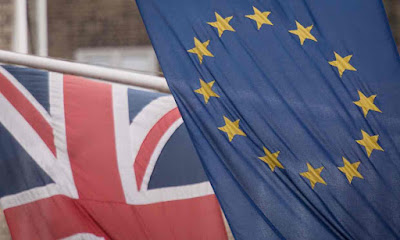English legislative issues is at danger of plunging into US-style "culture wars", as per another investigation of the powers that prompted to the vote to leave the European Union on 23 June.
Examination of a scope of surveying and review information by the autonomous National Center for Social Research and research organization the UK in a Changing Europe has found that the issues driving the voters' choice to back Brexit cut crosswise over social classes and conventional partisan loyalties.
'Red, white and blue Brexit': clarifying May's hitting hung vision
Perused more
US governmental issues has been grasped as of late by what have turned out to be known as "culture wars" – between laid-back, internationalist liberals and safeguards of the all the more socially moderate values that cleared Donald Trump to the White House.
Kirby Swales, the creator of the new report, Understanding the Leave Vote, says the submission battle, in which against migration feeling was a vital component, uncovered a progression of partitions in British society. His exploration, in light of studies of voters all through the choice battle and a short time later, recognizes three unmistakable gatherings that voted to leave the EU.
Donald Trump
Facebook Twitter Pinterest
The review drew parallels between the Brexit vote, and the socially moderate voter base that won Donald Trump the decision. Photo: EPA
And additionally the monetarily "deserted", whom Westminster government officials some of the time see as the prime movers behind the Brexit vote, there were "well-off Eurosceptics", fairly hostile to migration additionally against welfare; and the "more established average workers" – maybe not attempting to make a decent living, but rather still worried about the changing way of society.
The stories you have to peruse, in one convenient email
Perused more
"The EU choice was very divisive, highlighting an extensive variety of social, topographical and different contrasts in Great Britain. This was less a conventional left-right fight, and more about personality and qualities. It is a solid sign that the purported 'culture wars' of the US have landed in Great Britain vigorously," the report says.
A September review that split voters as indicated by their convictions on a progression of social issues found that 66% of those whose qualities could be described as "dictator", and only 18% of the individuals who were "libertarian", supported Brexit.
"Dictators" are characterized as those more inclined to back a progression of articulations including "for a few violations, capital punishment is the most proper sentence" and "youngsters today don't have enough regard for conventional British qualities".
At the point when taken a gander at on a left-right political scale, 53% of those on the privilege and half of those on the left voted take off. "This proposes this civil argument may be progressively chosen by perspectives on satisfactory social conduct and good decency, instead of redistribution and the part of the state," said the review.
That might be a resound of the awful open deliberation about social values that portrayed the US presidential level headed discussion. One review found that voters' response to the question, "is it more imperative for a youngster to be circumspect or all around mannered?" was a superior indicator of whether they would bolster Trump than their wage level, for instance.
A leave supporter outside parliament.
Facebook Twitter Pinterest
The leave vote was bolstered by three gatherings: the financially 'deserted', well-to-do Eurosceptics, and the more established regular workers. Photo: Mike Kemp/In Pictures by means of Getty Images
The Brexit investigation additionally calls attention to that differential turnout influenced the outcome, with leave voters more prone to go to the surveys.
Ad
The stay camp contended energetically to persuade the general population that voting to leave the EU would be dangerous for the economy, with a barrage of Treasury-upheld records and intercessions from specialists, including Bank of England representative Mark Carney and International Monetary Fund overseeing executive Christine Lagarde. In any case, the review recommends they neglected to influence even those voters who said they sponsored stay before the crusade to turn out and vote. Upwards of 19% of remain supporters didn't make it to the surveying corner, contrasted and 11% of those inclining towards a vote in favor of leave.
The economy was viewed as the most imperative component driving the vote, refered to by 21% of voters, while 20% specified movement. Be that as it may, individuals were more persuaded by the possibility that leaving the EU would cut movement (66%) than that it would "exacerbate Britain's economy off" (43%).
That may have driven the way that remain supporters seem to have been less roused to turn out. "Two focuses emerge from our investigation. The first is that the EU choice pulled in another arrangement of voters and they will probably vote clear out. The second is that the remain vote plainly diminished amid the crusade," said the report.
The solid position taken by some against EU daily papers, including the Sun and the Daily Mail, likewise seems to have been essential. "When it went to the EU choice vote, individuals will probably take after the position of the daily paper they read than the political party they relate to," the review claims. As indicated by the examination, 70% of Sun perusers and 66% of Mail perusers upheld leave, while only 9% of Guardian perusers did as such.
The sources utilized as a part of the review incorporate the definitive British Social Attitudes Survey and the British Election Study.

No comments:
Post a Comment